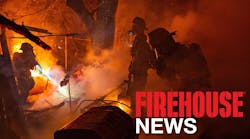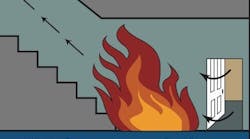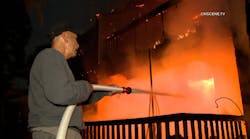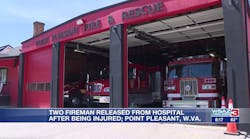The fact that firefighters represent government or the "State" and are a uniformed entity can be reason enough for the perverse and rebellious to want to inflict harm upon them. Firefighters are also an easy objective to attack, as opposed to the Police, in that they are unarmed.
In the days when the Bronx was burning in the 70's it was not uncommon for the fire department to respond to a car fire in the middle of a city block. Upon arrival, a second vehicle would be placed at the other end of the street blocking the firefighters' exodus. The trapped engine would then become the target of incensed people on the roofs of the surrounding buildings who hurled bricks, bottles and garbage at the firefighters.
In Sarajevo in 1993 the fire department was often called to extinguish a "huge blaze" that had been reported by telephone. Given information that there was a large fire, many pieces of equipment would be dispatched to the scene. As the firefighters arrived they became the target for a sniper who had positioned himself to kill as many firemen as possible. The "fire" was in fact a false alarm and had been deliberately reported by the sniper himself.
In times of socio/economic uncertainty, war and civil unrest, acts of violence which result in fire are quite frequent. Fire is often the instrument of choice on the part of the disobedient in creating chaos. It has been utilized to deliberately destroy property, create obstacles for the police or to attack institutions and the forces of order. During these incidents the fire department is called to extinguish the flames which are also essential to the outcome of the destruction desired by the malevolent. In turn, firefighters become a most unwanted figure.
Roughly twenty years ago, in the townships surrounding Johannesburg, most notably in Alexandria, riots were the order of the day. The fires in these shantytowns proved to be outright conflagrations at times. In addition to the destruction of these miserable dwellings, which housed some of the poorest people in the world, there were many fatalities as well. The fire department, which literally fought an uphill battle in Hell on Earth to at least keep the fires from spreading and rescue as many people as possible, was shot at and apparatus were pelted with Molotov cocktails.
Subsequent to the Yugoslav Army's egress from Kosovo and the United Nations and KFOR's entry in June 1999, mayhem was overwhelming. Kosovar Albanians who had been oppressed and forced to become refugees in Albania and Macedonia were now returning by the thousands. To "even the score" with the Serbs who had oppressed them, in addition to murder, the Kosovar Albanians most commonly utilized fire as the means of destroying all things Serbian. The ill-equipped and feeble Kosovo Fire Department always turned out to extinguish the fires independent of whether it was a Serb or Albanian home that was burning. However, there were many times when the infamous UCK terrorists stopped firemen from performing their duty with the threat of death, even when a whole block was burning. In other instances, it was the people of a particular neighborhood who scrutinized the ethnicity of the firefighters before allowing them to fight a fire. Albanian firefighters were not welcome in Serb neighborhoods and vice versa. Even when Albanians tried to extinguish the fire in a Serb home - or the other way around - they became the target of insults at first, then rocks and bottles. Often the feeling was, "this is a Serb fire and can ONLY be extinguished by Serbian firefighters - or Albanian as the case may be. Since the fire department in Kosovo was really the only entity where Serbs and Albanians worked together, they would both come under attack if seen working side by side.
In all of these circumstances and in every place where the threat to firefighters has been prevalent there has never been a case of the fire department not intervening or fulfilling its duty. It is due to the same ethic we are part of worldwide. Most evident were the nuclear reactor fire in Chernobyl in 1986 and the World Trade Center attack in New York in 2001. It is the nature of the firefighter to run in when all others run out. It is for this reason that although we are cognizant of the dangers that exist we respond just the same. We do it every day.
However, in areas where the dangers to firefighters go beyond what can be inflicted by fires, explosions and hazardous materials we must address the issue with a dynamic, professional and realistic approach - much in the same way we approach all the emergencies we are tasked to squelch. We must take a very close look at what our actual role is and what must be done and who must assist us in getting the job safely.
Size-Up is our first step. What are the problems we will encounter, when will they most likely occur, what are they derived from and who are the perpetrators?
Once we have evaluated the risks inherent to a particular type of incident in times of civil strife we must formulate the means to confront and resolve the problem.
What resources are needed - and are available - to guarantee a higher level of safety to firefighters in these instances? What level of prevention can be initiated on the part of the political authorities to minimize the risk?
The answers to these questions will determine how the individual department can deal with the dangers at hand. The best solutions, as always, are those that are simple and practical. Sometimes the objective can be reached with little or no cost involved and can be enacted by the fire department itself. Other instances may require an investment or an elaborate plan involving entities outside the fire department. As in much of our work, cooperation with other organizations is essential. It is also important to create a level of understanding on the political level. Where this is not possible we must take a harder look at our role.
It is also important to realize not only what are the required resources - both material and human - but what their availability is as well. The besieged fire departments cited earlier applied a variation of methods in dealing with the safety of their people in times of unrest.
In New York in the 70's closed cabs for fire apparatus were introduced - they were made of plywood at first, but firefighters now had refuge INSIDE the apparatus. The men no longer rode the back step as well. The sniper in Sarajevo was dealt with by simply sending the Police or the military to check out the report of a huge fire by a single caller - after 5 days he stopped calling. In Johannesburg the fire department began utilizing a Riot Pumper completely bullet proof and capable of using turrets for directing water similar to aircrash apparatus. It was also capable of covering itself with water or foam to douse the petrol bombs thrown at it. In Kosovo there were more logistics involved. Fires in certain areas, that required the intervention of firefighters of an ethnicity different from that of the inhabitants in the location of the fire, were handled through a joint effort by United Nations Fire Rescue, the United Nations Police and KFOR - the NATO led military peacekeeping force. The Kosovar firefighters would respond immediately and report to the confines of the neighborhood in question. There they would be met by a UN Fire Officer and UN Police who would escort them to the scene of the fire. At that point KFOR troops would literally surround the area involved forbidding anyone to enter without the UN Fire Officer's consent.
Unfortunately, there are times, when circumstances are beyond our limits and capabilities. We must therefore be wise enough to understand that we can not do the impossible and that we can not go from being a rescuer to becoming a victim ourselves. This is very hard for firefighters to comprehend at times. They called us, someone needs our help so we MUST intervene is the logic of why we exist as firefighters. However, when a severe life threat to firefighters is most imminent, when there is a total lack of resources and/or the political will to protect firefighters, we must make a stand and say, "this is not our job". This is a very hard pill to swallow. Usually when this has been the case it is an isolated incident and not a common, blanket policy with regard to intervening. In most instances it becomes the incident that causes the powers that be to provide the necessary political will.
Right now, a place that traditionally holds the fire department in high regard, but that could turn nasty should firefighters be called in to put out fires by strikers is Caracas, Venezuela. Firefighters there may instantaneously become the "bad guys".
Any city that is host to international meetings, summits or conferences, that by their nature, may incite the notorious "No-Global" movement may find themselves in a situation whereby firefighters come under attack. This group has proven to be quite violent towards firefighters, most notably in France.
The individual firefighter should be cognizant of a tense situation that exists. Become knowledgeable of the current political situation and the repercussions that could be derived from certain political decisions. Make a personal mental plan of action in the event the fire department may be called into a politically volatile area.
The fire department must also make this size-up and begin as soon as it is obvious that there will be fires due to civil unrest to take necessary measures. Coordinate with the proper entities to provide maximum protection for firefighters. To draw the line with regard to going beyond one's capabilities and limits - which includes the level of protection being provided.
As I have pointed out, incidents of firefighters becoming a target for violence are not limited exclusively to times of war or any geographic area. Many fire departments may find themselves in similar situations. Therefore, it is imperative for the fire department as an organization and the firefighter as an individual to be prepared for such instances and to apply the same preplanning sense that we already utilize to minimize the risk to our people and to be as successful as possible with the resources at hand for the everyday instances.





